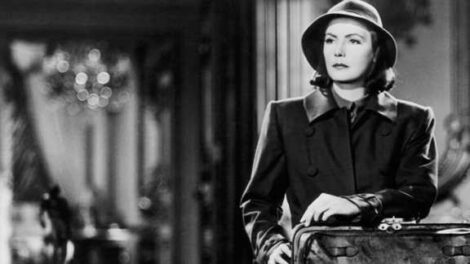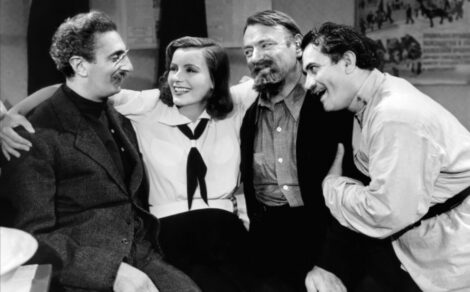Ninotchka
Front Row at the Movies by Shirrel Rhoades
[mr_rating_result]I used to see Greta Garbo walking along the sidewalks of the Upper East Side in New York. She seemed such a lonely figure. Maybe she had achieved her famous dictum: “I vant to be alone.”
That’s why I watch her film “Ninotchka” every chance I get. A romantic comedy, it was billed: “Garbo Laughs.”
It’s playing at Tropic Cinema.
 Considered one of the greatest actresses of all time, Swedish-born Greta Lovisa Gustafsson was known for her “melancholic, somber persona, her film portrayals of tragic characters, and her subtle and understated performances.”
Considered one of the greatest actresses of all time, Swedish-born Greta Lovisa Gustafsson was known for her “melancholic, somber persona, her film portrayals of tragic characters, and her subtle and understated performances.”
So a rom-com was certainly a change of pace.
Directed by Ernst Lubitsch (“The Shop Around the Corner”) and written by Billy Wilder (“Some Like It Hot”), Charles Brackett (“Niagara”), and Walter Reisch (“The Merry Widower”), “Ninotchka” is considered by many as Garbo’s “penultimate film.” For it, she received her third and final Academy Award nomination as Best Actress.
The plot gives us three agents from the Russian Board of Trade who arrive in Paris to sell jewelry confiscated from the aristocracy during the 1917 Russia Revolution. The jewels rightfully belong to the Grand Duchess Swanna (Ina Claire), so the dashing Count Léon d’Algout (Melvyn Douglas) offers to help retrieve the baubles with a lawsuit. In response, Moscow sends Nina Ivanovna “Ninotchka” Yakushova (Greta Garbo) to Paris to counter the lawsuit and complete the jewelry sale. Predictably, Ninotchka and the Count fall for each other, which complicates matters. How Count d’Algout wins her over (with the help of the three agents) is the film’s satisfying dénouement.
Being a big hit, the studio tried to rekindle the magic by pairing her again with Melvyn Douglas in another rom-com, this one titled “Two-Faced Woman.” Not a critical success, she called it “my grave.” It was her last film.
 Billy Wilder offered her the role of Norma Desmond in “Sunset Boulevard,” but she turned it down.
Billy Wilder offered her the role of Norma Desmond in “Sunset Boulevard,” but she turned it down.
Retiring at thirty-six, she had made 28 feature films in her short career. She explained, “I was tired of Hollywood. I did not like my work. There were many days when I had to force myself to go to the studio … I really wanted to live another life.”
Contrary to popular myth, Garbo had many friends. Even so, she remained socially awkward throughout her life. She avoided parties and industry gatherings, never appearing at Oscar ceremonies even when she was nominated. She never signed autographs or answered fan mail, and rarely gave interviews.
That’s why I never stopped Greta Garbo on the street to say hello, even though she was my neighbor, living only four blocks from my New York apartment. On the other hand, another neighbor – Katherine Hepburn – always stopped sweeping the sidewalk in front of her apartment to say a curt, friendly hello when I passed.
Email Shirrel: srhoades@aol.com


Ratings & Comments
[mr_rating_form]